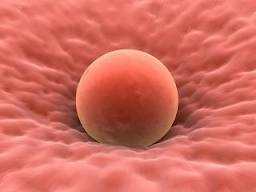 Implantation starts around 7-12 days after your conception. Before now the egg has been fertilized and the cells have started to divide, creating a zygote. This zygote will then implant into the uterine wall. There are a few symptoms you can expect once this occurs.
Implantation starts around 7-12 days after your conception. Before now the egg has been fertilized and the cells have started to divide, creating a zygote. This zygote will then implant into the uterine wall. There are a few symptoms you can expect once this occurs.
When Do Implantation Symptoms Start?
In general, the implantation is a phase of pregnancy occurs on average 9 days after ovulation, which involves attachment of the fertilized egg to the uterine lining. According to a variety of studies, fertilization of the egg can start in as few as 12 hours of ovulation, but no longer than 24 hours past ovulation.
Women do not usually experience symptoms of pregnancy before implantation, but the implantation increases the levels of the pregnancy hormone HCG which will cause most of pregnancy symptoms. In many cases, women will start experiencing these symptoms around week 4. Generally, pregnancy results are less accurate before the implantation, therefore, it is recommended to check your pregnancy until your period ends.
Common Implantation Symptoms
Implantation bleeding is one of the first signs that you could be pregnant, occurring 6-12 days after conception. This is caused by the embryo implanting into the uterine wall. You might experience light cramping or spotting for several days. If the implantation was unsuccessful, the regular menstrual flow will flush the egg out of your body.
1. Cramping and Spotting
Spotting and cramping are usually signs of ovulation. However, when the ovulation occurred around a week before your period, cramping and spotting might be a sign that the egg has implanted. You might notice pink or brown vaginal discharge on your underwear or toilet paper. Cramping for 1-2 days during implantation is common. Some women will frequently experience spotting between periods which is difficult to tell if it’s a sign of pregnancy.
2. Breasts Discomfort
Your breasts may become tender and swollen once the egg has implanted. This is also a sign of ovulation, but the tenderness of breasts will only last a few days due to ovulation. Women who are pregnant will notice that this tenderness is more persistent.
3. Changing Tastes on Food
Some notice an increased sense of smell or taste occurs when they are pregnant, which can cause intense cravings or aversions to certain foods. If these symptoms occur around 7 days after ovulation, it could be a sign of implantation. It is generally believed that the alteration in hormones that comes with pregnancy causes alteration in our food tastes.
4. Temperature Changes
Early after implantation you may notice that your body temperature increases slightly due to the increased progesterone levels. If the egg did not implant and you are preparing for your period, progesterone levels will drop very quickly which will cause your temperature to drop as well. Also, some women do notice that their temperature suddenly dips 7-10 days after ovulation as a sign that they have conceived.
5. Missed Period
Women who are pregnant will notice that they no longer get a period. However, other life changes such as illness, stress or surgery could also make this happen. You should focus on whether the missed period comes with other pregnancy signs to ensure that you really have conceived.
Here is a video sharing some experience of early pregnancy signs before missed period:
Less Common Implantation Symptoms
1. Fatigue
Pregnancy causes a significant rise in your metabolic rate as your body works to support your growing baby. Except for more sleep, the implantation can make you feel quite tired all day long. This is because the progesterone hormone increases during pregnancy and also acts as a sedative. If you need to stop and rest because of these excess hormones, do so to keep up your strength.
2. Morning Sickness
Nearly 99 percent of pregnant women have morning sickness that includes nausea or vomiting at some point during the day. This can also cause headaches or backaches. This is considered to be one of the most difficult pregnancy symptoms to manage. Ginger has been found to be helpful in easing morning sickness.
3. Constipation
Constipation can happen to anyone but if this occurs along with other symptoms like spotting or morning sickness it could mean that you are pregnant. The increase in hormones in pregnancy can cause your intestines to relax which increases your risk of constipation. There are plenty of over the counter medications that will help ease this, but double check with your doctor about which can be used when you are pregnant.
4. Pimples and Acne
An additional implantation symptom is pimples or acne. Try not to squeeze these as they occur because this can ruin your complexion.
There are some other symptoms that are not classically known to be a part of pregnancy. Not everyone experiences symptoms equally, so it can be difficult to tell if you are truly pregnant. Learning about the symptoms above can make women who are trying for pregnancy more capable to know if they are pregnant.
When Can You Take a Pregnancy Test?
Pregnancy tests are designed to look for the HCG hormone that the body produces after implantation. The body usually starts to produce this hormone very quickly with levels doubling every 2-3 days though it can take as much as 3-4 weeks for a detectable amount of this hormoneon a pregnancy test. Usually, the best sign to know if you are ready to take a pregnancy test is a missed period. You can use a urine test at home or a blood test performed by a doctor to determine if you get pregnant. Urine tests tend to be more accurate in the morning because your urine will be more concentrated in the morning.

